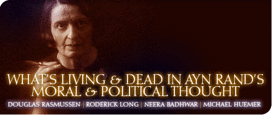Thanks to my fellow symposiasts for a terrific conversation! And likewise to our hosts at Cato for sponsoring it.
Just a few last observations:
I agree with what Doug says about abstraction; indeed the distinction between precisive and non-precisive abstraction has been one of my chief hobbyhorses for some time. (See, e.g., this piece [pdf].) I don’t see how that point about abstraction conflicts with anything I said about universal vs. individualized aspects of human nature, however. The abstraction mammal is individualized in different ways in different mammals, but that doesn’t change the fact that some properties belong to all mammals qua mammals (such as being warm-blooded), while others vary according to the individualization (such as having or not having fur); individualization does not invalidate what is essential to the class as a whole. So what’s good for any given mammal will depend in part on universally mammalian properties (the needs of warm-blooded animals) and in part on properties specific to that species or indeed to that individual organism. Why should it be different with humans?
At first I was puzzled as to why Neera should think that “the existence of wicked people” shows the falsity of the claim that everyone who remains alive is “rationally committed to morality.” But now I think there’s an ambiguity on “committed.” In one sense, being “committed” to something is a matter of deliberately dedicating oneself to it; in that sense, obviously not everyone is committed to morality. But in another sense, one is “committed” to something if one’s current beliefs and projects logically entail it, whether or not one recognizes this fact; and in that sense, of course, the existence of evil people is no evidence against the claim that everyone is committed to morality.
Finally, Neera wonders whether I’m saying that one wrong act destroys one’s character. I certainly don’t think that (and neither, incidentally, did Kant). What I’m saying is that in each individual choice situation, the virtuous choice is eudaimonically preferable to the non-eudaimonic choice. I think there’s a danger of confusing the claim that I should choose death over an unjust act with the claim that if I do choose an unjust act, my life thereafter is no longer worth living. The second claim doesn’t follow from the first. The preference ranking goes as follows:
a) Top choice, I act justly at time t and go on living afterward.
b) Second choice, I act justly at time t and then perish.
c) Third choice, I act unjustly at time t and go on living afterward.
d) Bottom choice, I act unjustly at time t and then perish.
Now when I’m confronted with the choice between justice and survival, then obviously (a) is no longer an option. So I should then choose (b). But suppose I fail to do so; instead I commit the unjust action at t. In that case, (b) is no longer an option, and so the best option for me now is (c) rather than (d). As I understand it, eudaimonic choice is about ranking options in particular case after particular case — not about some stark once-for-all choice between a happy life per se and an unhappy one per se. As the Austrians have taught us, choice happens at the margin.

